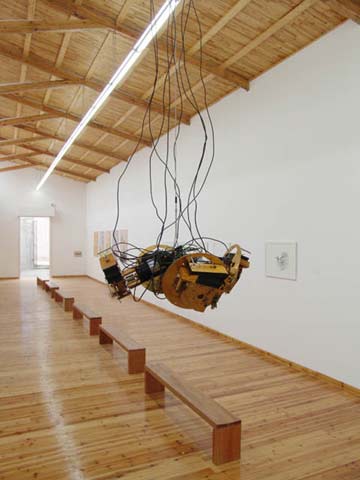Judith Fegerl
Via the Athanasius Kircher Society: artist Judith Fegerl has created a sculpture that mechanically replicates the song of a nightingale.
It may sound like a nightingale, but to me it looks more like the viscera of several giant music boxes lashed together and suspended in a robot butcher’s shop. Perhaps the art lies in the cognitive dissonance?
Fegerl claims as inspiration the Hans Christian Andersen story, but one can’t build a mechanical nightingale without dragging in Keats (Thou wast not born for death, immortal Bird!) and the lofty, mystic Yeats. Yeats’ “Sailing to Byzantium” is one of my five favorite poems, and one of the few I still have memorized. It captures the artist-intellectual’s conflicted desire to supplant the unmanageable, messy passions of the body with the perfected, reassuring eternity of art. Once out of Nature . . . but do we really want to escape Nature? Wouldn’t we prefer to stop it, stay it, halt the sun at the very cusp of summer?
If technology ever gives us the power to extend the summer of our lives indefinitely, will we still feel the need to create lasting art?
“Sailing to Byzantium”
William Butler Yeats, 1927I
That is no country for old men. The young
In one another’s arms, birds in the trees
–Those dying generations — at their song,
The salmon-falls, the mackerel-crowded seas,
Fish, flesh, or fowl, commend all summer long
Whatever is begotten, born, and dies.
Caught in that sensual music all neglect
Monuments of unageing intellect.II
An aged man is but a paltry thing,
A tattered coat upon a stick, unless
Soul clap its hands and sing, and louder sing
For every tatter in its mortal dress,
Nor is there singing school but studying
Monuments of its own magnificence;
And therefore I have sailed the seas and come
To the holy city of Byzantium.III
O sages standing in God’s holy fire
As in the gold mosaic of a wall,
Come from the holy fire, perne in a gyre,
And be the singing-masters of my soul.
Consume my heart away; sick with desire
And fastened to a dying animal
It knows not what it is; and gather me
Into the artifice of eternity.IV
Once out of nature I shall never take
My bodily form from any natural thing,
But such a form as Grecian goldsmiths make
Of hammered gold and gold enameling
To keep a drowsy Emperor awake;
Or set upon a golden bough to sing
To lords and ladies of Byzantium
Of what is past, or passing, or to come.

